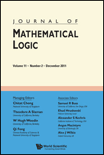
Journal of Mathematical Logic
metrics 2024
Unraveling the Mysteries of Logic and Reasoning
Introduction
Journal of Mathematical Logic, published by World Scientific Publishing Co Pte Ltd, stands as a premier platform for the dissemination of cutting-edge research in the field of logic, with a notable Q1 ranking in the category of Logic for 2023. Catering to an international audience of researchers, professionals, and students, this journal serves as a vital resource for the latest advancements and theoretical developments in mathematical logic. Spanning from 2007 to 2024, the journal emphasizes contributions that explore both foundational and applied aspects of logic, thereby appealing to a diverse readership. Although currently subscribed access only, the journal’s rigorous peer-review process ensures high-quality publications that enrich the academic discourse within the mathematical community. With its strategic location in Singapore, the Journal of Mathematical Logic not only contributes to the global conversation in mathematics but also fosters collaboration among scholars from various backgrounds.
Metrics 2024
 0.92
0.92 0.90
0.90 1.00
1.00 16
16Metrics History
Rank 2024
Scopus
IF (Web Of Science)
JCI (Web Of Science)
Quartile History
Similar Journals
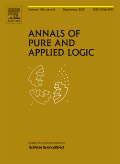
ANNALS OF PURE AND APPLIED LOGIC
Bridging Theory and Practice in Logical ResearchANNALS OF PURE AND APPLIED LOGIC is a premier academic journal published by Elsevier, specializing in the foundational aspects of logic since its inception in 1974. With a strong commitment to disseminating original research, the journal focuses on both pure and applied logic, making significant contributions to the fields of mathematics and computer science. The journal is recognized for its rigorous peer-review process and is currently ranked Q1 in Logic, reflecting its status among the top-tier publications in the discipline. Researchers will find valuable insights and advancements in logical theory and practice in its pages, while the journal's Scopus ranking further positions it strategically within the mathematical logic community. Although it is not an open-access publication, it offers convenient access options for institutions and subscribers, ensuring a wide reach for groundbreaking findings. The ANNALS OF PURE AND APPLIED LOGIC continues to be an essential resource for professionals, students, and academics alike, facilitating a deeper understanding of logical frameworks and their applications.

ARCHIVE FOR MATHEMATICAL LOGIC
Advancing Knowledge in Logic and PhilosophyArchive for Mathematical Logic, published by Springer Heidelberg, is a distinguished academic journal that delves into the intricate realms of mathematical logic and its philosophical implications. With an ISSN of 0933-5846 and an E-ISSN of 1432-0665, this journal is recognized for its rigorous peer-reviewed articles that contribute significantly to the understanding of logical frameworks. As of 2023, it has achieved a commendable Q2 ranking in Logic and a prestigious Q1 ranking in Philosophy, reflecting its impact within these intellectual fields. Operating from the United States with a publishing address in Heidelberg, Germany, the journal encompasses research spanning from 1988 to 2024, providing a rich historical context to contemporary discussions. With its robust Scopus rankings, it stands at the 70th percentile in Arts and Humanities - Philosophy and holds a notable ranking in Mathematics - Logic, further underscoring its relevance. While it is not an open-access journal, it remains vital for researchers, professionals, and students seeking to advance their knowledge and engage with cutting-edge discussions in mathematical logic and its philosophical applications.
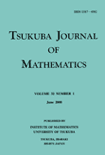
Tsukuba Journal of Mathematics
Cultivating a Community of Mathematical ExcellenceTsukuba Journal of Mathematics is a distinguished publication dedicated to advancing the field of mathematics through the dissemination of innovative research and comprehensive studies. Published by the University of Tsukuba, Department of Mathematics, this journal serves as a vital platform for mathematicians, researchers, and students to engage with cutting-edge mathematical theories and methodologies. Although currently not available as an open-access journal, it maintains a strong academic presence, contributing significantly to the global mathematical landscape. The journal invites submissions across various branches of mathematics, aiming to foster scholarly communication and collaboration. The ISSN 0387-4982 and the E-ISSN 2423-821X further establish its credibility and accessibility among the academic community, supporting its critical objective of facilitating high-quality research output. Situated in Tsukuba, Japan, a hub for scientific research and development, the Tsukuba Journal of Mathematics is committed to bridging gaps in mathematical knowledge and encouraging exploration of novel ideas.
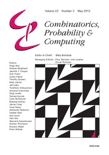
COMBINATORICS PROBABILITY & COMPUTING
Shaping the Future of Probability and Combinatorial ScienceCOMBINATORICS PROBABILITY & COMPUTING is a premier journal published by Cambridge University Press, focusing on the cutting-edge fields of combinatorics, probability, and their computational aspects. Established in 1992 and set to continue its impactful discourse through 2024, this journal holds a distinguished reputation, reflected in its Q1 ranking in applied mathematics, computational theory, and statistics, showcasing its pivotal role in advancing research in these areas. With an ISSN of 0963-5483 and an E-ISSN of 1469-2163, the journal welcomes high-quality papers that contribute to the theoretical foundations and practical applications of the disciplines. While it is not available as open access, its accessibility through institutional subscriptions ensures wide readership within academia. The journal is a vital resource for researchers, professionals, and students alike, providing a platform for innovative ideas and pioneering research that shapes the future of mathematics and computer science.
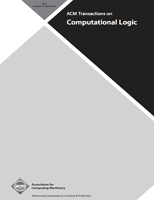
ACM Transactions on Computational Logic
Pioneering Research in Computational LogicACM Transactions on Computational Logic, published by the Association for Computing Machinery, is a premier journal dedicated to the advancement of computational logic, spanning the disciplines of computer science and mathematics. With its ISSN 1529-3785 and E-ISSN 1557-945X, this journal has established itself as a vital resource within the academic community, particularly noted for its influential contributions reflected in its 2023 scopus rankings. The journal holds notable quartile rankings, achieving Q1 in the fields of Computer Science (miscellaneous) and Logic, alongside Q2 in Computational Mathematics and Theoretical Computer Science, indicating its prestigious position in the respective categories. Researchers, practitioners, and students can access a wealth of rigorous research articles that delve into both theoretical frameworks and practical applications of computational logic, fostering innovation and collaboration in the field. As it converges towards its 2024 objectives, ACM Transactions on Computational Logic continues to uphold a commitment to excellence and impact, striving to shape the future of computational theories and methodologies.

Reports on Mathematical Logic
Exploring the Foundations of ThoughtReports on Mathematical Logic is an esteemed academic journal published by Jagiellonian University’s Theoretical Computer Science Department in Poland. Focusing on the interdisciplinary realms of logic and philosophy, this journal publishes rigorous research articles that explore the foundational aspects and implications of mathematical logic in various contexts. Although it currently maintains an open access model, the journal's impact can be seen through its categorized rankings, with a Q4 in Logic and a commendable Q2 in Philosophy as of 2023. This positions it as a valuable resource for academics seeking to engage with innovative ideas and methodologies in the field. Additionally, the journal has a historical academic presence, having converged in its publication years from 2011 to 2014 and again from 2016 to 2023, underscoring its ongoing commitment to advancing knowledge in logic. With a focus on contemporary research, Reports on Mathematical Logic is essential for researchers, professionals, and students aiming to stay at the forefront of logic studies.

JOURNAL OF THE AMERICAN MATHEMATICAL SOCIETY
Advancing Mathematical Frontiers with AuthorityThe Journal of the American Mathematical Society (ISSN: 0894-0347; E-ISSN: 1088-6834), published by the American Mathematical Society, stands as a pillar in the fields of mathematics and applied mathematics. This prestigious journal, with a remarkable impact factor and ranking in the top tier (*Q1*) within both the Applied Mathematics and general Mathematics categories, is recognized for its contribution to advancing mathematical research and theory. With data reflecting it as the 8th ranked journal in General Mathematics (top 2%) and the 34th in Applied Mathematics (top 6%), the journal consistently showcases groundbreaking studies and innovative methods that greatly influence academia and industry alike. Though not an open-access journal, it offers a wealth of resources and intellectual discourse for researchers, professionals, and students alike. Specializing in comprehensive and theoretical aspects of mathematics, the Journal remains dedicated to publishing articles that promote understanding and propel the field forward, highlighting its significance as an essential tool for those engaged in mathematical research.

Commentationes Mathematicae Universitatis Carolinae
Advancing Knowledge in Mathematics Since 1996Commentationes Mathematicae Universitatis Carolinae, with ISSN 0010-2628 and E-ISSN 1213-7243, is a distinguished academic journal published by the Faculty of Mathematics and Physics at Charles University in the Czech Republic. Established in 1996, this journal serves as a platform for original research articles and contributions in the field of mathematics, catering to a diverse range of topics within the discipline. While classified in the Q4 quartile for 2023, it occupies an important niche within the mathematical community, particularly for emerging research and comprehensive studies. Although it is not open access, it offers authors an opportunity to disseminate their work through a reputable publisher, renowned for its scholarly contributions. With a focus on fostering academic discourse, Commentationes Mathematicae aims to engage researchers, professionals, and students alike, enriching the mathematical landscape and promoting collaboration within the field.
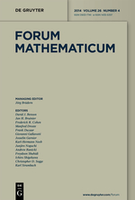
FORUM MATHEMATICUM
Championing Rigorous Analysis and Methodologies in MathematicsFORUM MATHEMATICUM, published by WALTER DE GRUYTER GMBH, is a distinguished academic journal based in Germany, known for its significant contributions to the field of mathematics. With an ISSN of 0933-7741 and an E-ISSN of 1435-5337, the journal features comprehensive studies ranging from applied mathematics to diverse mathematical disciplines. Having maintained a commendable presence since 1989, FORUM MATHEMATICUM has achieved notable classification rankings, including Q2 in Applied Mathematics and Q1 in miscellaneous Mathematics as of 2023. Additionally, it holds a Scopus rank within the top 60th percentile in General Mathematics, making it a prominent platform for researchers and professionals seeking rigorous analysis and innovative methodologies in mathematics. While the journal does not currently offer open access, its rich content is pivotal for advancing mathematical theory and applications, appealing to students and seasoned academics alike.

Algebra and Logic
Bridging Theory and Practice in Mathematics.Algebra and Logic is a prestigious journal published by Springer, focusing on the intricate fields of algebra, number theory, analysis, and logic. With a history spanning over five decades since its inception in 1968, the journal serves as a critical platform for scholars and practitioners to disseminate cutting-edge research, theoretical advancements, and practical applications within these mathematical domains. Notably, it holds a distinguished Q2 ranking in its categories for 2023, reflecting its impact and relevance in the academic landscape. Though the journal does not currently offer open access options, its rigorous peer-review process ensures the highest standards of scholarly integrity and quality. Additionally, its Scopus rankings further underline its significance, with placements in the competitive percentiles in various subfields. Algebra and Logic is essential reading for anyone involved in mathematical research, providing invaluable insights and fostering dialogue among researchers, professionals, and students alike.